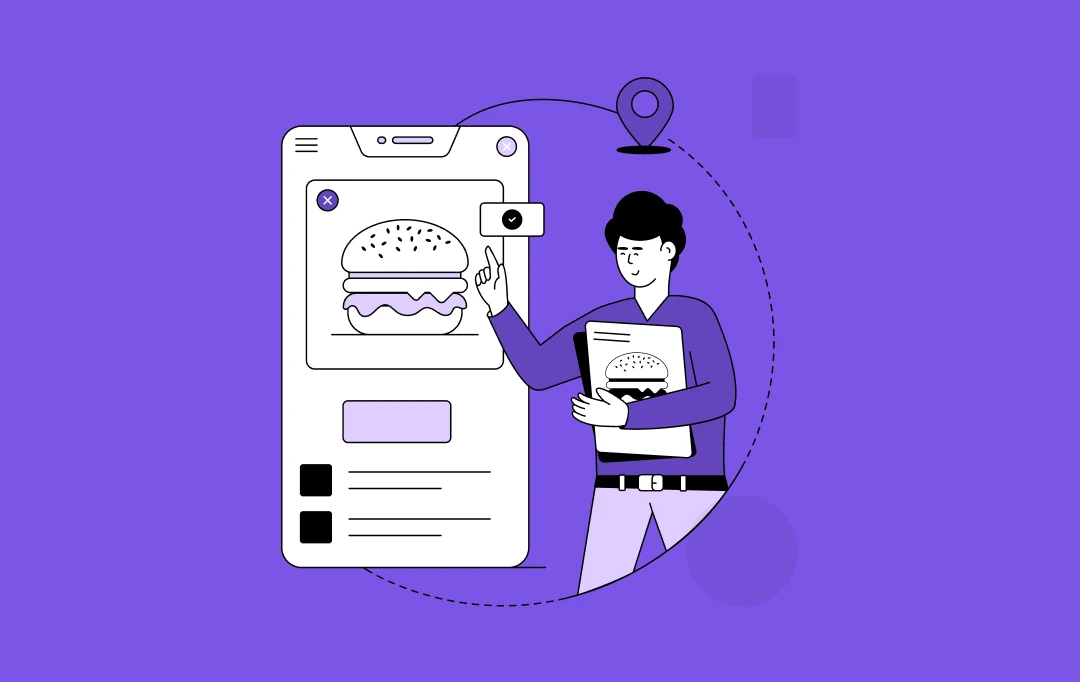The food industry is a goldmine for emerging entrepreneurs. How? With global revenue expected to hit $9.68 trillion by the end of 2025 (Statista), the sector presents startups with immense opportunities to shake up the market with new, technology-enabled ideas. Why? Consumers today crave more than just good food; they demand speed, convenience, and immersive experiences, all powered by technology.
With changing customers’ demands and the onset of digitalization, traditional restaurant models are struggling to remain competitive. Today’s most successful restaurants leverage advanced technologies to drive efficiency, deliver a better customer experience, and drive rapid growth. This is why restaurants of the new age are using technology to drive efficiency, deliver a better customer experience, and grow faster than ever.
This shift creates the perfect landscape for entrepreneurs to launch innovative restaurant ventures that align with modern diners’ expectations for speed, convenience, and personalization. Restaurant business ideas like cloud kitchens, AI-driven automation, blockchain-powered food traceability, and voice-enabled ordering are transforming the industry. Start-ups can build highly scalable and profitable businesses by strategically integrating these technologies from the outset.
If you are unsure which restaurant business opportunities best align with market demands or how to bring your vision to life, this blog is for you. This blog will explore the top 10 high-potential restaurant business ideas and how startups can leverage technology to turn them into reality.
10 Profitable Restaurant Business Ideas for Emerging Entrepreneurs
Explore the top 10 innovative ideas for the restaurant business that can elevate your digital transformation journey and set your food business apart. These new ideas for restaurant business focus on leveraging cutting-edge technologies to enhance operational efficiency, improve customer engagement, and drive long-term profitability. So, without further ado, let’s unveil some lucrative types of business for restaurants:
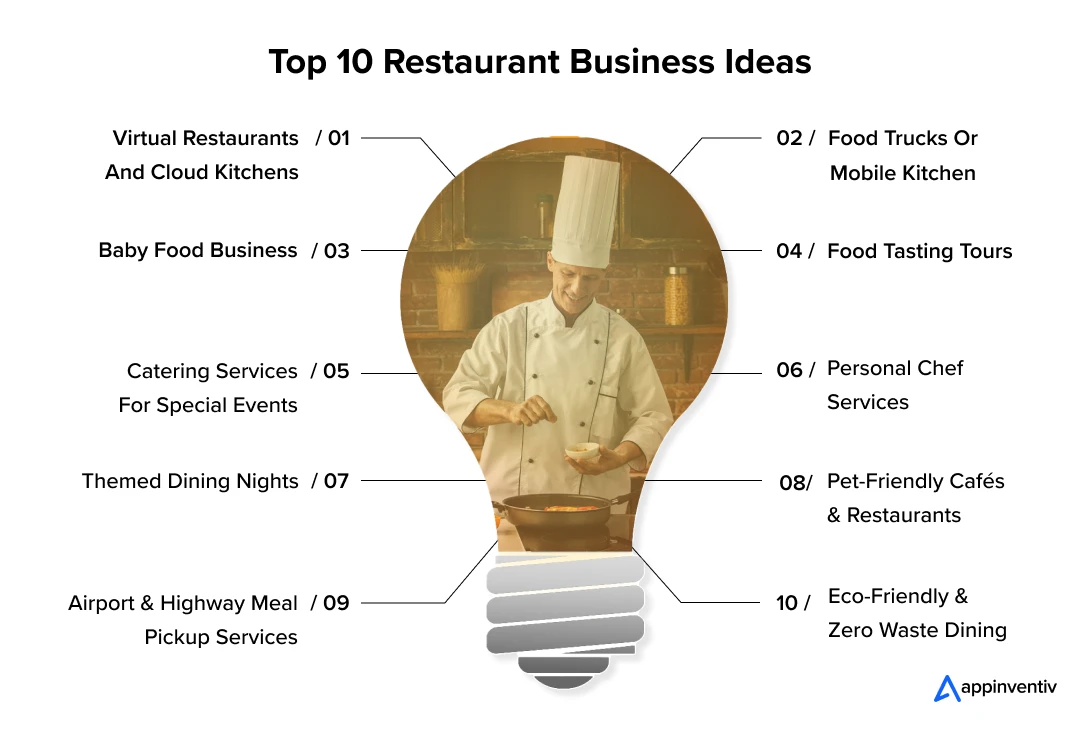 Virtual Restaurants and Cloud Kitchens
Virtual Restaurants and Cloud Kitchens
It is one of the most innovative restaurant ideas, serving only online food delivery. Contradictory to traditional restaurants that need costly real estate infrastructure, seating setups, and front-of-house personnel, cloud kitchens function from centralized commercial locations, concentrating solely on food preparation for delivery.
This economic model enables restaurants to reduce expenses while attracting a wider customer audience via food delivery services.
Real-World Example: Uber Eats, DoorDash, and Zomato are some leading companies that have adopted this innovative idea and received immense success.
Role of Technology in Cloud Kitchen Idea
One of the key reasons why cloud kitchens succeed is because of seamless digital integrations. From automated order handling to AI-driven kitchen oversight, technology is vital in boosting cloud kitchen efficiency.
Here is a table outlining how technology enhances the efficiency of cloud kitchens and virtual restaurants:
| Technology |
Impact on Cloud Kitchens and Virtual Restaurants |
| AI-Powered Order Management |
Automates multi-platform order processing, reducing errors and delays. |
| IoT-Enabled Smart Kitchens |
Enhances efficiency and ensures optimal cooking conditions. |
| Cloud-Based POS and CRM Systems |
Unifies sales, customer data, and multi-brand management. |
| Data Analytics and Demand Forecasting |
Optimizes menu offerings and pricing strategies based on trends. |
| Automated Inventory and Supply Chain Management |
Minimizes waste, tracks stock, and predicts shortages in real time. |
| Delivery and Route Optimization Apps |
Enhances delivery efficiency with real-time tracking and analytics. |
Food Trucks or Mobile Kitchens
One of the most affordable and highly varied restaurant business concepts, food trucks or mobile kitchens enable entrepreneurs to deliver gourmet options at a fraction of the cost of traditional brick-and-mortar establishments. These mobile vendors offer a flexible and scalable business model, bringing convenience to consumers in high-traffic areas, events, and business areas.
Compared to traditional restaurants, food trucks minimize fixed expenses like rent and utilities and allow operators to experiment with different locations and menus. This mobility makes food trucks an attractive business opportunity for chefs and restaurateurs who need to establish a brand with little initial capital.
Real-World Example: Successful examples of restaurant business models of food vehicles are Kogi BBQ (Los Angeles) and The Halal Guys (New York). They have become nationwide sensations and established their mobile kitchen operations as full-blown restaurant chains.
Role of Technology in Food Trucks and Mobile Kitchens
Technology is at the core of facilitating efficient mobile kitchen operations, customer interaction, and efficient service. From GPS tracking to AI-driven order management, technology helps food truck operators scale, streamline, and elevate operations.
| Technology |
Impact on Food Trucks and Mobile Kitchens |
| Mobile POS Systems |
Enables cashless transactions and tracks sales. |
| GPS and Location-Based Tracking |
Helps customers find food trucks easily. |
| AI-Based Inventory Management |
Prevents stock shortages and reduces food waste. |
| Social Media and Mobile Marketing |
Drives customer engagement and loyalty. |
| Online Ordering and Pre-Booking |
Reduces wait times and enhances service speed. |
Baby Food Business
As health consciousness and nutrition awareness grow, people want more organic, fresh, and personalized infant food. Parents seek nutritionally smart substitutes for ready-made infant foods, driving demand for businesses that offer organic, preservative-free, and nutritionally balanced options.
Compared to pre-packaged baby foods, a custom baby food company allows parents to select fresh ingredients tailored to their baby’s dietary needs, varying from allergy-safe food options to a nutrition-dense mix that supports both physical and cognitive development.
Real-World Example: Companies such as Little Spoon and Yumi have become more popular by delivering fresh, organic baby food to modern moms and consumers.
Role of Technology in the Baby Food Business
Technology improves the efficiency of operations by simplifying order management, maintaining food safety compliance, and providing customized meal plans.
| Technology |
Impact on the Baby Food Business |
| AI-Powered Meal Customization |
Suggests personalized baby food plans based on age, diet, and allergies. |
| Blockchain-Based Food Safety Tracking |
Ensures transparency in ingredient sourcing and food safety. |
| Subscription-Based Ordering Systems |
Simplifies recurring orders and meal plan customization. |
| Delivery Optimization Algorithms |
Enhances doorstep delivery efficiency, reducing spoilage. |
| Nutritional Data Analytics |
Provides insights into dietary trends for continuous meal improvement. |
Food Tasting Tours
Food-tasting tours offer consumers a rich gastronomic experience where they can taste various cuisines and native flavors. These tours are designed for foodies, tourists, and social diners seeking unique culinary adventures that they can’t find in one restaurant.
Unlike traditional dining establishments, food tasting tours offer a dynamic, multi-location experience, guiding participants through restaurants, street food stalls, or wineries to enjoy curated tasting menus highlighting regional specialties and culinary craftsmanship.
Real-World Example: Devour Tours in Barcelona and Secret Food Tours in Paris are both successful at delivering experiential food tourism that is appealing to locals as well as tourists.
Role of Technology in Food Tasting Tours
Technology is vital in coordinating, promoting, and organizing food-tasting tours effectively.
| Technology |
Impact on Food Tasting Tours |
| Mobile Booking Applications |
Allows easy reservation management for a seamless customer experience. |
| AI-Based Personalized Recommendations |
Suggests food tours based on dietary preferences and previous bookings. |
| AR/VR Integration for Previews |
Offers a virtual preview of the experience before booking. |
| QR Code-Based Digital Menus |
Enables easy access to menu details and nutritional information at tour stops. |
| Chatbots and Virtual Assistants |
Provide instant customer support and tour updates. |
Catering Services for Special Events
Catering companies are changing from conventional buffet-style catering to personalized gourmet menus, AI-based logistics, and touchless ordering for everything from weddings to corporate events.
Unlike traditional catering companies that concentrate solely on food preparation, contemporary catering companies use technology to automate processes, host huge events in a cost-effective manner, and improve the experiences of guests with interactive menus and live cooking features.
Real-World Example: EzCater and Hungry have embraced this technology in the catering sector and are providing on-demand catering solutions backed by AI-powered menu planning and logistics optimization.
Role of Technology in Catering Businesses
Technology assists in rationalizing logistics, handling bulk orders, and enhancing customer satisfaction.
| Technology |
Impact on Catering Businesses |
| AI-Powered Event Planning |
Optimizes food quantities based on guest count and preferences. |
| Cloud-Based Catering Management Software |
Automates order tracking, delivery logistics, and staff scheduling. |
| Interactive Digital Menus |
Allows guests to customize meals and dietary preferences in real time. |
| Blockchain for Supply Chain Transparency |
Ensures ethical sourcing and ingredient tracking. |
| Augmented Reality (AR) Food Previews |
Enhances menu selection with 3D food visualizations. |
Personal Chef Services
The demand for personalized dining is rising, with individuals opting for gourmet, home-cooked meals prepared by professional chefs. Personal chef services are available for working professionals, sports personalities, and families who wish for tailored meal plans according to their dietary requirements.
In contrast to conventional restaurants, personal chef operations cut overhead infrastructural expenses by serving clients within their homes. The business enjoys flexibility and exclusivity, presenting customized meal preparation, in-house dining, and online cooking classes.
Real-World Example: Brands such as Hire A Chef and Chefs for Seniors have established a robust marketplace presence, where customers can hire personal chefs for private dinner meals and weekly meal options.
Role of Technology in Personal Chef Services
Technology is changing how personal chefs receive bookings, prepare meal plans, and communicate with clients.
| Technology |
Impact on Personal Chef Businesses |
| AI-Based Personalized Meal Planning |
Creates customized menus based on dietary needs and preferences. |
| Cloud-Based Appointment Booking |
Simplifies scheduling and client management. |
| AR/VR Cooking Lessons |
Enhances engagement with immersive virtual cooking experiences. |
| Blockchain for Ingredient Sourcing |
Ensures transparency in food quality and sourcing. |
| Mobile Payment and Subscription Platforms |
Enables seamless payment for recurring services. |
Themed Dining Nights
Themed dining nights offer an immersive culinary experience where food, entertainment, and storytelling come together to create a unique atmosphere. These events range from era-inspired dinners and interactive murder mystery nights to experiential food journeys and chef-led stage shows.
In contrast to conventional restaurants that stick to a fixed menu and atmosphere, themed dining nights provide novelty, exclusivity, and narrative, which appeal to food enthusiasts seeking distinct, Instagram-worthy experiences.
Real-World Example: Restaurants such as Dans Le Noir? (Paris, London) and The Lockhart (Harry Potter-themed restaurant, Canada) have been able to attract a loyal clientele by providing memorable theme-based dining experiences.
Role of Technology in Themed Dining
Technology makes themed dining come alive by increasing involvement and operational effectiveness.
| Technology |
Impact on Themed Dining Nights |
| Augmented Reality and Projection Mapping |
Creates immersive dining environments with digital overlays. |
| AI-Powered Reservation Management |
Automates bookings and guest list customization. |
| Interactive Digital Menus |
Enhances storytelling through themed dish descriptions and visuals. |
| Live Streaming for Virtual Participation |
Expands reach for online-themed dining experiences. |
| AI-Driven Personalization |
Customizes experiences based on customer preferences and past visits. |
Pet-Friendly Cafés and Restaurants
Restaurants that welcome pets are gaining traction as owners look for shared experiences with their furry companions. Pet menus, playparks, and community outreach initiatives at restaurants and cafes draw pet owners.
As opposed to other eateries that keep pets off-limits, pet-friendly restaurants design a welcoming ambiance, enticing pet lovers.
Real-World Example: Cafés such as Boris & Horton (New York) and Dog Café (Los Angeles) are now social hubs for pet owners, combining pet-friendly dining with community experiences.
Role of Technology in Pet-Friendly Restaurants
The table below highlights how technology assists in setting up and elevating your pet-friendly food business.
| Technology |
Impact on Pet-Friendly Cafés & Restaurants |
| AI-Powered Pet Menu Customization |
Creates tailored and separate meal options for different breeds and dietary needs. |
| IoT-Enabled Pet Health Monitoring |
Tracks pet nutrition and hydration levels. |
| Mobile Reservation and Loyalty Apps |
Simplifies bookings and offers exclusive pet rewards. |
| AR-Based Virtual Pet Play Areas |
Enhances on-site entertainment for pets and owners. |
| Blockchain for Sustainable Pet Food Sourcing |
Ensures ethical ingredient sourcing and pet food safety. |
Airport and Highway Meal Pickup Services
As more individuals look for convenient meal options during their travels, highway, and airport meal pickup services are emerging as a huge trend. The services allow food ordering along transit points, reducing waiting time and offering travelers better convenience.
In contrast to the usual airport eateries, digital meal pickup services enable passengers to order in advance, personalize meals, and grab food on the fly without unnecessary wait times.
Real-World Example: Grab and AtYourGate have introduced airport mobile ordering apps, allowing customers to pre-order food and skip the queue.
Role of Technology in Airport and Highway Meal Pickup
Technology is vital in optimizing meal ordering, improving service speed, and enhancing traveler convenience.
| Technology |
Impact on Airport & Highway Meal Pickup |
| AI-Powered Demand Forecasting |
Reduces wait times by predicting peak demand. |
| Mobile App Integration |
Enables seamless pre-ordering and pickup scheduling. |
| Contactless Payment Solutions |
Enhances safety and convenience in a fast-paced location. |
| Location-Based Order Notifications |
Alerts customers when their food is ready for pickup. |
| Cloud POS and Inventory Tracking |
Ensures real-time stock management and meal availability. |
Eco-Friendly and Zero-Waste Dining
As sustainability takes center stage in the restaurant industry, eco-friendly and zero-waste restaurant ideas are gaining momentum. These restaurants actively work to minimize their environmental footprint by sourcing ingredients sustainably, composting food scraps, using biodegradable packaging, and implementing waste-reduction strategies in their kitchens. Many also embrace farm-to-table sourcing, upcycled furniture, and water conservation measures to create a more sustainable dining experience.
Unlike traditional restaurants that contribute to significant food waste, zero-waste restaurants maximize portion control, recycle leftovers, and minimize waste effectively.
Real-World Example: Silo (London) and Nolla (Helsinki) are pioneering zero-waste restaurant chains, using the principles of circular thinking to minimize waste to zero and deliver world-class food.
Role of Technology in Eco-Friendly and Zero-Waste Dining
Technology is critical in optimizing waste handling, eco-friendly sourcing, and business efficiency.
| Technology |
Impact on Eco-Friendly & Zero-Waste Dining |
| AI-Based Food Waste Analytics |
Monitors and minimizes food waste by analyzing consumption patterns. |
| Smart Inventory Management |
Prevents over-purchasing and optimizes ingredient utilization. |
| Blockchain for Sustainable Sourcing |
Ensures ethical sourcing and transparency in the food supply chain. |
| IoT-Enabled Energy and Water Conservation |
Automates energy usage and reduces resource consumption. |
| Digital Waste Composting and Recycling Solutions |
Facilitates composting, recycling, and upcycling of food waste. |
How to Turn Your Restaurant Business Idea into Reality: Step-by-Step Process
It requires more than a great concept to make a restaurant business idea become a reality. It requires strategic thinking, technology integration, and customer-centric implementation. Regardless of whether you are starting a cloud kitchen, food truck, pet café, or AI restaurant, the following steps will assist you in being successful with your restaurant business:
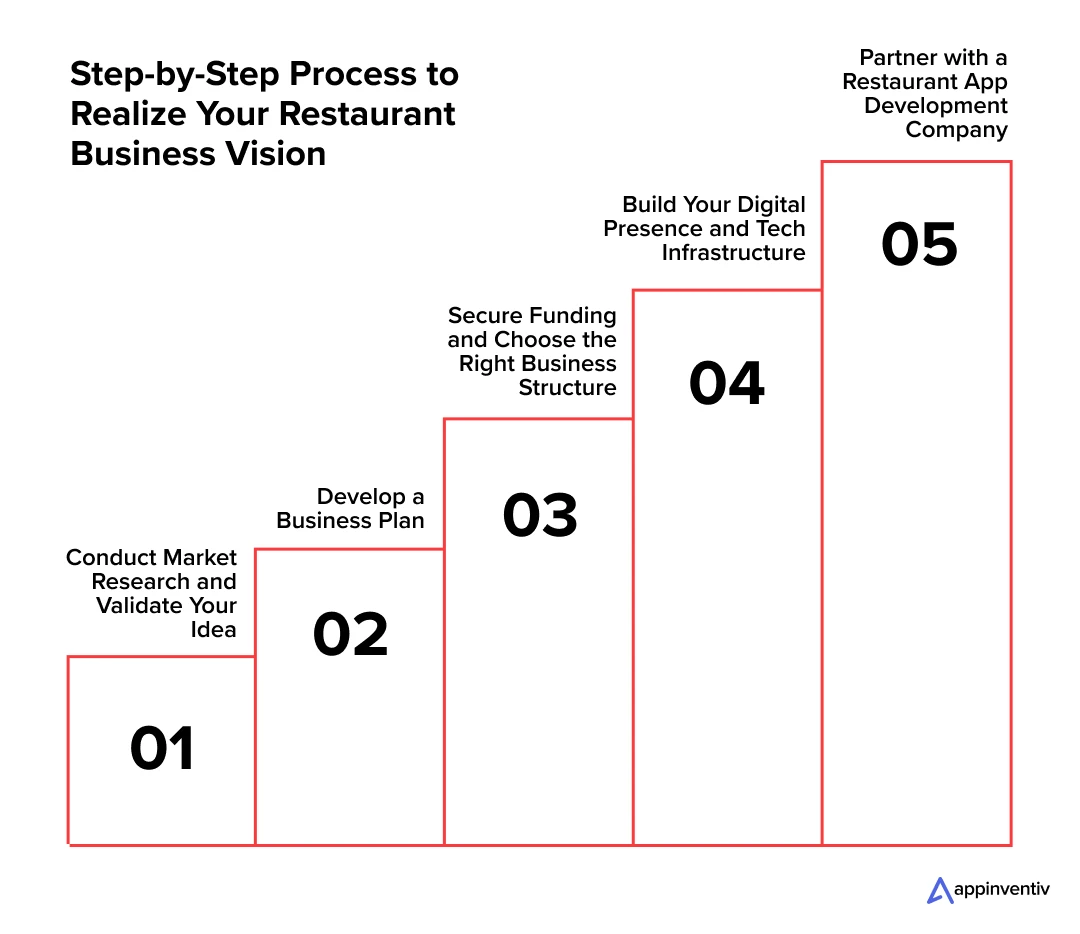 Step 1: Conduct Market Research and Validate Your Idea
Step 1: Conduct Market Research and Validate Your Idea
Firstly, you ought to know your target market, analyze competitors, and determine market demand. Market research aids in knowing whether your restaurant business concept will be viable or not.
Key Considerations:
- Define your target market: Are you serving busy professionals, families, health-oriented consumers, or pet owners?
- Competitor analysis: Investigate well-performing restaurants of similar concepts to learn about pricing, viable service models, and special features.
- Measure market demand: Conduct online surveys, social media polls, and industry reports to estimate possible customer interest.
- Test your concept: Host pop-up events, pilot projects, or soft launches to pilot-test customer response before scaling up.
Step 2: Develop a Business Plan for Restaurants
A good business plan is a roadmap for your restaurant business, allowing you to pursue financing, make sound decisions, and stay on track.
Your business plan should include:
- ️ Executive Summary – A summary of your restaurant idea, target market, and unique selling point (USP).
- ️Business Model – Will your restaurant be dine-in, takeaway, cloud-based, or subscription-based?
- Menu Planning and Pricing Strategy – Determine menu items, pricing strategy, and supply chain alliances.
- Marketing Strategy – Describe how you will attract and retain customers (e.g., social media, SEO, influencer marketing, referral programs).
- Financial Projections – Finalize startup costs, revenue estimates, and funding requirements.
- Technology Stack – Select appropriate restaurant management software, POS system, AI-driven automation software, and digital ordering solutions.
Also Read: Cloud-Based POS vs Legacy POS Systems
Step 3: Secure Funding and Choose the Right Business Structure
Restaurant setup, equipment, marketing, and operational costs require funding. Select the ideal business structure to avail maximum tax benefits and explore funding options.
Funding Options:
- Self-Funding – If you have enough capital, bootstrapping gives you full ownership and control.
- Bank Loans and Business Grants – Know about the banks that offer SME loans and restaurant financing schemes. Also, learn about government grants for food businesses.
- Angel Investors and Venture Capitalists – Investors fund innovative ideas for the food business with good growth prospects. Explore them and prepare a plan for successful approval.
Choosing a Business Structure:
- ️Sole Proprietorship – Suitable for small food ventures but has personal liability risks.
- Partnership – It is best to begin with a co-founder, but legal arrangements are required.
- Limited Liability Company (LLC) – Offers protection from personal liability while providing tax advantages.
- Franchise Model – If growing rapidly, franchising enables others to use your brand name. Alternatively, you can also take franchises of other big brands.
Step 4: Build Your Digital Presence and Tech Infrastructure
In 2025, restaurants have smart tech at their core. A unified digital presence heightens customer convenience and increases profitability.
Essential Digital Platforms:
- ️ Restaurant Website and Mobile Apps – Make online booking, order tracking, and electronic payment possible.
- AI-Powered Chatbots – Automate customer inquiries, make personalized recommendations, and manage bookings.
- Cloud-Based POS and CRM – Easily manage orders, inventory, and customer data.
- Delivery and Order Management Integration – Integrate with food delivery apps or implement your own delivery system.
Step 5: Partner with a Restaurant App Development Company
Partnering with an experienced app development company is crucial to building your digital presence and staying competitive in a tech-driven restaurant landscape. A restaurant app development company can help you build a seamless, feature-rich digital ecosystem tailored to your business model—whether it’s a cloud kitchen, full-service restaurant, or a hybrid concept.
What they do:
- Enable online ordering, reservations, and loyalty programs by creating a mobile app
- Personalize customer interactions with chatbots and smart recommendations.
- Integrate POS, CRM, and analytics for efficient operations.
- Ensure your unique ideas for restaurants support growth while maintaining data security.
- Employ AI-powered demand forecasting to reduce overstocking and food waste.
- Implement blockchain tracking for transparent and accountable sourcing.
- Automate inventory management to track stock levels and resupply efficiently.
- Monitors and maintains your digital solutions to gain restaurant business advantages.
Bring Your Restaurant Vision to Life with Appinventiv
The restaurant industry is experiencing a revolution fueled by AI-powered automation, voice ordering, blockchain traceability of food, AR/VR dining, and green technology. These business ideas for restaurants improve efficiency, save costs, and facilitate sustainability and are key to sustainable success.
Therefore, entrepreneurs wishing to enter the restaurant industry must embrace technology-driven solutions that improve efficiency, reduce costs, and expand customer engagement to stay ahead of the game. This is where a restaurant app development company like Appinventiv can help.
At Appinventiv, we specialize in creating personalized digital solutions for emerging startups and leading brands. From AI-driven restaurant management software and order apps for mobile to IoT-driven energy solutions and blockchain-driven supply chains, we help businesses digitize, grow successfully, and future-proof their business.
Don’t believe us? Let’s have a quick view of the case studies of leading brands like KFC, Pizza Hut, and Domino’s, who counted on us and received tangible outcomes.
1. KFC: Expanding Digital Reach and Driving Direct Orders
KFC partnered with us to build a robust mobile ordering system that reduced dependency on third-party aggregators and improved direct customer engagement. Appinventiv developed seven mobile applications across multiple markets, enabling:
- A 22% increase in conversion rates
- Over 50% increase in the total orders coming through the app
- A 60% rise in repeat purchases
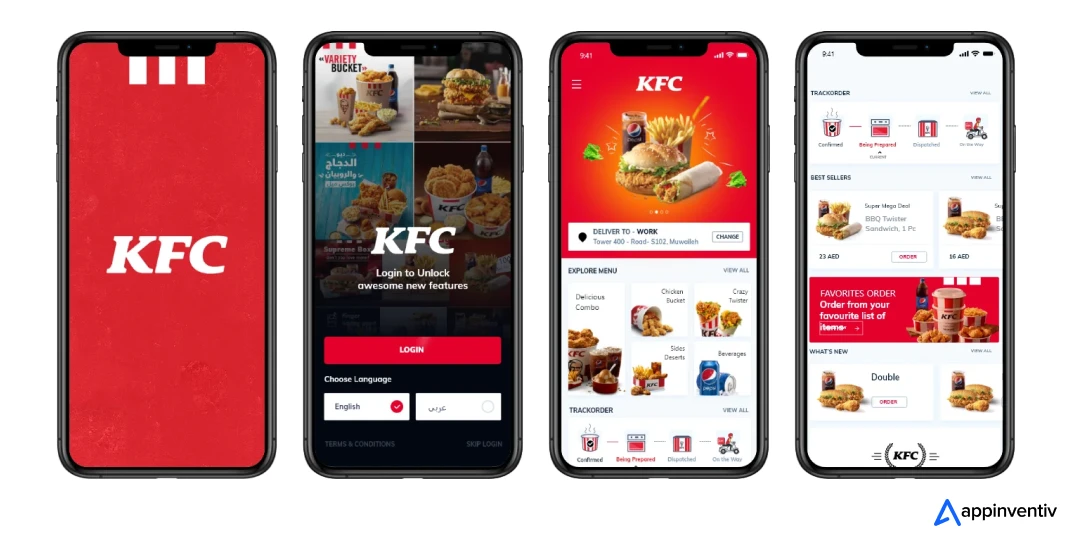
2. Domino’s: Enhancing the User Experience and Increasing Conversions
When Domino’s saw an increase in mobile app bounce rates and declining user retention, they collaborated with Appinventiv to rebuild their digital experience. Our strategic UI/UX overhaul led to:
- A 23% boost in conversion rates
- Seamless order placement and intuitive user journey
- Improved customer sentiment and higher ratings
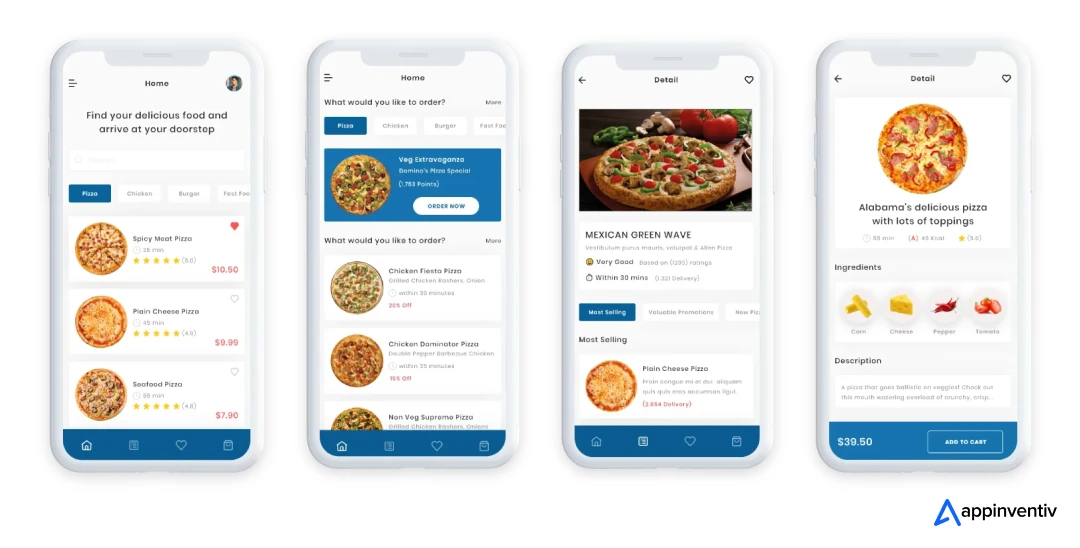
3. Pizza Hut: Improving Efficiency and Accelerating Order Processing
As a global brand, Pizza Hut needed an interactive, scalable, and agile mobile app to cope with rising customer demand. Through AI-based recommendations, real-time tracking, and speedy checkout. Appinventiv helped the brand achieve the following:
- A 30% increase in app conversion rates
- Smoother, faster order transactions
- Higher customer engagement and satisfaction
Ready to turn your restaurant business ideas into reality? Collaborate with Appinventiv to create innovative digital solutions that fuel growth and success.
FAQs
Q. How to start a restaurant business?
A. Here is a step-by-step process to bring your business ideas for restaurants to life
- Conduct Market Research and Validate Your Idea
- Develop a Business Plan
- Secure Funding and Choose the Right Business Structure
- Build Your Digital Presence and Tech Infrastructure
- Partner with a Restaurant App Development Company
Refer to the above blog to understand the core steps involved in realizing restaurant startup ideas.
Q. What is the future of the restaurant business?
A. The future of innovative restaurant business ideas is quite promising as they help streamline operations and enhance customers’ experience. For instance:
- Cloud Kitchens: Virtual restaurants cut costs and respond to online orders.
- AI & Automation: Smart technology automates ordering, staffing, and customer service.
- Touchless Dining: QR menus, contactless payments, and self-service kiosks enhance convenience.
- Sustainable Practices: Green packaging, plant-based, and reducing waste are gaining popularity.
Q. What are the key challenges to realizing restaurant improvement ideas, and how can they be overcome?
A. Entrepreneurs often face some common challenges when turning their innovative ideas for the food business into life. But worry not. You can easily overcome them by following some thoughtful strategies:
- High Expenses: Automate energy and inventory management to reduce expenses.
- Customer Loyalty: Use AI-driven personalized marketing and loyalty schemes.
- Supply Chain Challenges: Embrace predictive analytics and multi-sourcing practices.
Product Development & Engineering
IT Managed & Outsourcing
Consulting Services
Data Services
Didn't find what you're looking for? Let us know your needs, and we'll tailor a solution just for you.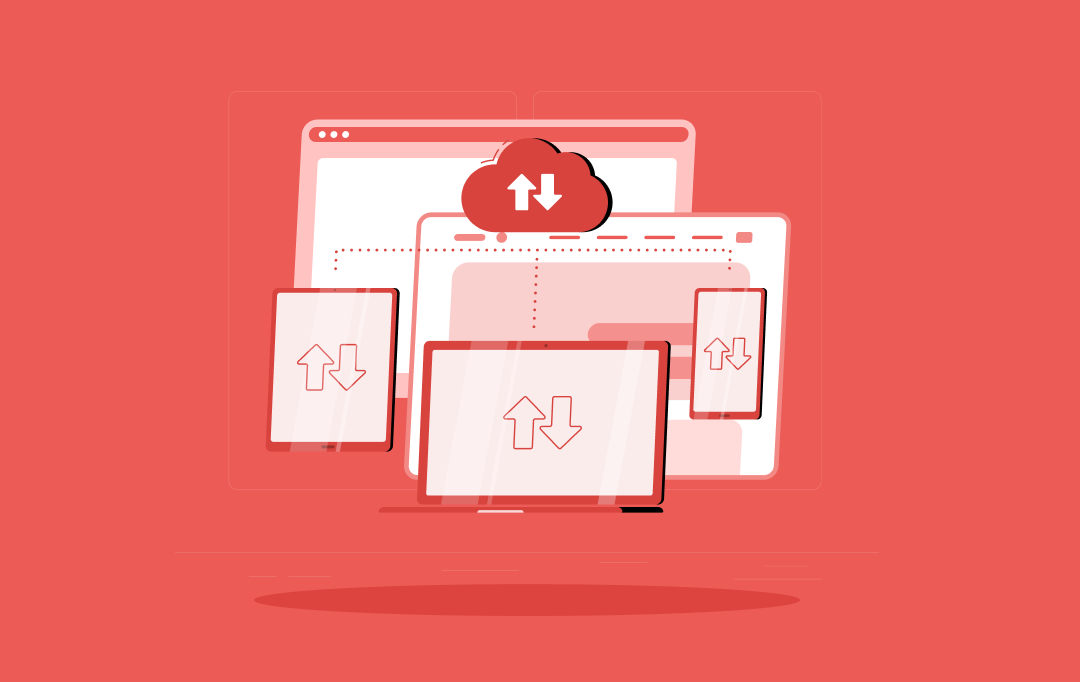
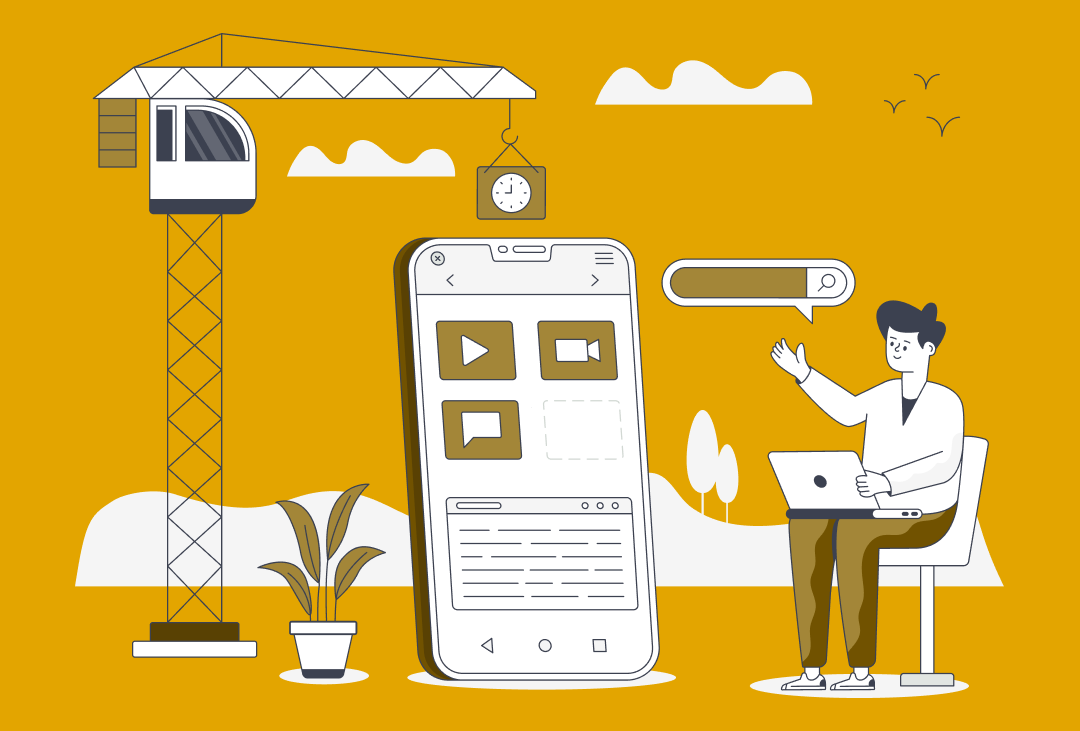




















 Virtual Restaurants and Cloud Kitchens
Virtual Restaurants and Cloud Kitchens Step 1: Conduct Market Research and Validate Your Idea
Step 1: Conduct Market Research and Validate Your Idea


